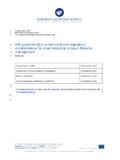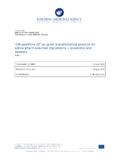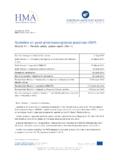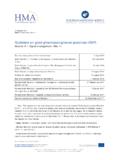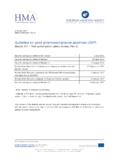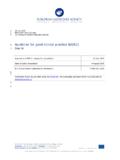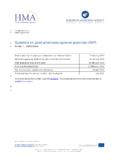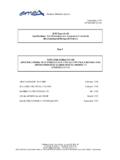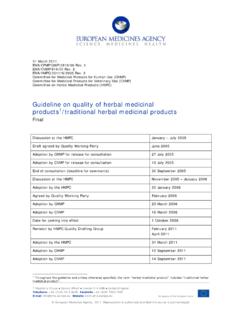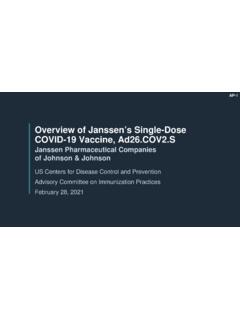Transcription of ANNEX I SUMMARY OF PRODUCT CHARACTERISTICS
1 1 ANNEX I SUMMARY OF PRODUCT CHARACTERISTICS 2 1. NAME OF THE MEDICINAL PRODUCT Nucala 100 mg solution for injection in pre-filled pen Nucala 100 mg solution for injection in pre-filled syringe Nucala 40 mg solution for injection in pre-filled syringe 2. QUALITATIVE AND QUANTITATIVE COMPOSITION Nucala 100 mg solution for injection in pre-filled pen Each 1 ml pre-filled pen contains 100 mg of mepolizumab. Nucala 100 mg solution for injection in pre-filled syringe Each 1 ml pre-filled syringe contains 100 mg of mepolizumab. Nucala 40 mg solution for injection in pre-filled syringe Each mL pre-filled syringe contains 40 mg of mepolizumab. Mepolizumab is a humanised monoclonal antibody produced in Chinese hamster ovary cells by recombinant DNA technology. For the full list of excipients, see section 3. PHARMACEUTICAL FORM Solution for injection (injection) A clear to opalescent, colourless to pale yellow to pale brown solution 4.
2 CLINICAL PARTICULARS Therapeutic indications Severe eosinophilic asthma Nucala is indicated as an add-on treatment for severe refractory eosinophilic asthma in adults, adolescents and children aged 6 years and older (see section ). Chronic rhinosinusitis with nasal polyps (CRSwNP) Nucala is indicated as an add-on therapy with intranasal corticosteroids for the treatment of adult patients with severe CRSwNP for whom therapy with systemic corticosteroids and/or surgery do not provide adequate disease control. Eosinophilic granulomatosis with polyangiitis (EGPA) Nucala is indicated as an add-on treatment for patients aged 6 years and older with relapsing-remitting or refractory eosinophilic granulomatosis with polyangiitis (EGPA). 3 Hypereosinophilic syndrome (HES) Nucala is indicated as an add-on treatment for adult patients with inadequately controlled hypereosinophilic syndrome without an identifiable non-haematologic secondary cause (see section ).
3 Posology and method of administration Nucala should be prescribed by physicians experienced in the diagnosis and treatment of severe refractory eosinophilic asthma, CRSwNP, EGPA or HES. Posology Severe eosinophilic asthma Adults and adolescents aged 12 years and over The recommended dose of mepolizumab is 100 mg administered subcutaneously once every 4 weeks. Children aged 6 to 11 years old The recommended dose of mepolizumab is 40 mg administered subcutaneously once every 4 weeks. Nucala is intended for long-term treatment. The need for continued therapy should be considered at least on an annual basis as determined by physician assessment of the patient s disease severity and level of control of exacerbations. CRSwNP Adults The recommended dose of mepolizumab is 100 mg administered subcutaneously once every 4 weeks. Nucala is intended for long-term treatment. Consideration can be given to alternative treatments in patients who have shown no response after 24 weeks of treatment for CRSwNP.
4 Some patients with initial partial response may subsequently improve with continued treatment beyond 24 weeks. EGPA Adults and adolescents aged 12 years and older The recommended dose of mepolizumab is 300 mg administered subcutaneously once every 4 weeks. The posology of mepolizumab in children and adolescents aged 6 to 17 years old with EGPA was supported by modelling and simulation data (see section ). Children aged 6 to 11 years old weighing 40 kg The recommended dose of mepolizumab is 200 mg administered subcutaneously once every 4 weeks. Children aged 6 to 11 years old weighing < 40 kg The recommended dose of mepolizumab is 100 mg administered subcutaneously once every 4 weeks. 4 Nucala is intended for long-term treatment. The need for continued therapy should be reviewed at least on an annual basis as determined by physician assessment of the patient s disease severity and improvement of symptom control.
5 Patients who develop life-threatening manifestations of EGPA should also be evaluated for the need for continued therapy, as Nucala has not been studied in this population. HES Adults The recommended dose of mepolizumab is 300 mg administered subcutaneously once every 4 weeks. Nucala is intended for long-term treatment. The need for continued therapy should be reviewed at least on an annual basis as determined by physician assessment of the patient s disease severity and level of symptom control. Patients who develop life-threatening manifestations of HES should also be evaluated for the need for continued therapy, as Nucala has not been studied in this population. Special populations Elderly patients No dose adjustment is required for elderly patients (see section ). Renal and hepatic impairment No dose adjustment is required in patients with renal or hepatic impairment (see section ).
6 Paediatric population Severe eosinophilic asthma Children aged 6 to 11 years old Nucala 100 mg powder for solution for injection and 40 mg solution for injection in pre-filled syringe are appropriate for administration to this population. Nucala 100 mg solution for injection in pre-filled pen and 100 mg solution for injection in pre-filled syringe are not indicated for administration to this population. Children less than 6 years old The safety and efficacy of mepolizumab in children less than 6 years old have not yet been established. No data are available. CRSwNP in children less than 18 years old The safety and efficacy in children with CRSwNP below the age of 18 years have not been established. No data are available. 5 EGPA in children less than 6 years old The safety and efficacy of mepolizumab has not been established in children below the age of 6 years old. No data are available.
7 HES in c hildren aged less than 18 years old The safety and efficacy of mepolizumab in children and adolescents aged less than 18 years old have not yet been established. Currently available data are described in sections , and but no recommendation on a posology can be made. Method of administration Nucala 100 mg solution for injection in pre-filled pen or pre-filled syringe The pre-filled pen or pre-filled syringe should be used for subcutaneous injection only. Nucala may be self-administered by the patient or administered by a caregiver if their healthcare professional determines that it is appropriate, and the patient or caregiver are trained in injection techniques. For children aged 6 to 11 years old, administration must be carried out by a healthcare professional or a trained caregiver. For self-administration the recommended injection sites are the abdomen or thigh. A caregiver can also inject Nucala into the upper arm.
8 For doses which require more than one injection, it is recommended that each injection is administered at least 5 cm apart. Comprehensive instructions for subcutaneous administration of Nucala in a pre-filled pen or pre-filled syringe are provided in the instructions for use in the package leaflet. Nucala 40 mg solution for injection in pre-filled syringe The pre-filled syringe should be used for subcutaneous injection only. Nucala must be administered by a healthcare professional or a caregiver. It may be administered by a caregiver if a healthcare professional determines that it is appropriate, and the caregiver is trained in injection techniques. The recommended injection sites are the upper arm, abdomen or thigh. Comprehensive instructions for subcutaneous administration of Nucala in a pre-filled syringe are provided in the instructions for use in the package leaflet. Contraindications Hypersensitivity to the active substance or to any of the excipients listed in section Special warnings and precautions for use Traceability 6 In order to improve the traceability of biological medicinal products, the name and the batch number of the administered PRODUCT should be clearly recorded.
9 Asthma exacerbations Mepolizumab should not be used to treat acute asthma exacerbations. Asthma-related adverse symptoms or exacerbations may occur during treatment. Patients should be instructed to seek medical advice if their asthma remains uncontrolled or worsens after initiation of treatment. Corticosteroids Abrupt discontinuation of corticosteroids after initiation of mepolizumab therapy is not recommended. Reduction in corticosteroid doses, if required, should be gradual and performed under the supervision of a physician. Hypersensitivity and administration-related reactions Acute and delayed systemic reactions, including hypersensitivity reactions ( anaphylaxis, urticaria, angioedema, rash, bronchospasm, hypotension), have occurred following administration of mepolizumab. These reactions generally occur within hours of administration, but in some instances have a delayed onset ( , typically within several days).
10 These reactions may occur for the first time after a long duration of treatment (see section ). In the event of a hypersensitivity reaction, appropriate treatment as clinically indicated should be initiated. Parasitic infections Eosinophils may be involved in the immunological response to some helminth infections. Patients with pre-existing helminth infections should be treated before starting therapy. If patients become infected whilst receiving treatment with mepolizumab and do not respond to anti-helminth treatment, temporary discontinuation of therapy should be considered. Organ threatening or life-threatening EGPA Nucala has not been studied in patients with organ threatening or life-threatening manifestations of EGPA (see section ). Life-threatening HES Nucala has not been studied in patients with life-threatening manifestations of HES (see section ). Excipients This medicinal PRODUCT contains less than 1 mmol sodium (23 mg) per 100 mg dose, that is to say essentially sodium-free.
